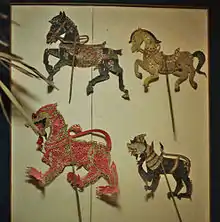Nang talung
Nang talung (Thai: หนังตะลุง, pronounced [nǎŋ tā.lūŋ]) is a traditional style of shadow puppetry from southern Thailand.[1] Similar arts are found in Cambodia, Malaysia, and Indonesia.[2][3][4] Nang means "leather" ("leather puppet" in this case), and talung is an abbreviation of Pattalung, a southern city where the shadow play tradition has long been popular. Nang yai features life-size puppets, while nang talung puppets are much smaller.[5]


Southern Thailand's puppets are made of leather and are typically between 15 and 50 centimeters in size. The performance consists of the puppets, the narrator, the actor, and the musician. The actor and the audience are separated by a white screen during the show.[6]

Nang talung has been extremely popular for a long time. On the other hand, the art form is slowly disappearing because it is complicated. There is a campaign to preserve the traditions of nang talung for future generations.[7]
The Malaysian wayang kulit gedek has its origin from Nang Talung.
References
- Lian Lim, Siew (2013). "The Role of Shadow Puppetry in the Development of Phatthalung Province, Thailand" (PDF). siewlianlim.com. Southeast Asia Club Conference, Northern Illinois University. Retrieved 27 August 2018.
- Nang Talung ICH, Thailand
- Thai Shadow Puppet Show Archived 2017-11-07 at the Wayback Machine, Museum of Anthropology, University of Missouri (2015)
- Siyuan Liu (2016). Routledge Handbook of Asian Theatre. Routledge. pp. 194, 553, 561. ISBN 978-1-317-27886-3.
- James R. Brandon (2009). Theatre in Southeast Asia. Harvard University Press. pp. 65–68. ISBN 978-0-674-02874-6.
- Nang Talung, XIP, Finland
- "Nang Talung Museum: Thai shadowplay made awesome". One Weird Globe. 2015-03-04. Archived from the original on 2015-03-08.